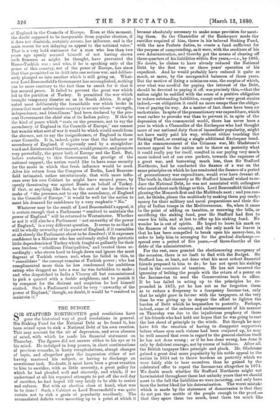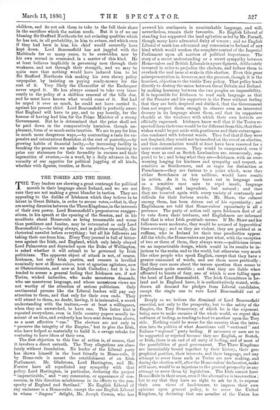THE BUDGET.
SLR STAFFORD NORTHCOTE'S good resolutions have gone the historical way of good resolutions in general. His Sinking Fund for the National Debt as he found it, has been seized upon to sink a National Debt of his own creation. This may account for the air of depression, and even absence of mind, with which he made his financial statement on Thursday. The figures did not answer either to his eye or to his mind. He indulged in long pauses, in short continuations of previous remarks, in hasty recapitulations, abrupt changes of topic, and altogether gave the impression either of not having mastered his subject, or having to discharge an unwelcome task. No doubt, it must have been a great vexation to him to sacrifice, with so little necessity, a great policy for which he had pleaded well and sincerely, and which, if we understand at all his repeated attempts to put off the evil day of sacrifice, he had hoped till very lately to be able to revive and enforce. But with an election close at hand, what was to be done ? Such a Cabinet as Lord Beaconsfield's was quite certain not to risk a grain of popularity needlessly. The accumulated deficits were mounting up to a point at which it
became absolutely necessary to make some provision for meet- ing them. So the Chancellor of the Exchequer made the sacrifice required of him, threw in his beloved Sinking Fund, with the new Probate duties, to create a fund sufficient for the purpose of compounding, as it were, with the creditors of his own Administration, and thereby got the means of clearing off three-quarters of his liabilities within five years,—i.e., by 1885. No doubt, he claims to have already reduced the National Debt by the first two or three years' operation of his expedient. And he would probably have reduced it quite as much, or more, by the unexpended balances of those years. But the motive of fixing a minimum sum, the surplus of which, over what was needful for paying the interest of the Debt, should be devoted to paying it off, was precisely this,—that the nation might be saddled with the sense of a positive obligation to reduce outstanding liabilities, except under very great strains indeed,—an obligation it could no more escape than the obliga- tion of paying its way. As a matter of fact, there have been no such strains. In spite of the precautionary war expenditure, which went rather to provoke war than to prevent it, in spite of the depression of the commercial world, there has never been a year in which a Chancellor of the Exchequer who had thought more of our national duty than of immediate popularity, might not have easily paid his way, without either touching the Sinking Fund, or creating a single additional Exchequer bond. At the commencement of the Crimean war, Mr. Gladstone's earnest appeal to the nation not to throw on posterity what it could really pay for itself, resulted in our paying very much more indeed out of our own pockets, towards the expenses of a great war, and borrowing much less, than Sir Stafford Northcote, had he conducted the finance of a war on the same principles on which he has conducted the finance of a period of precautionary war expenditure, would ever have dreamt of. The truth is, that sincerely as Sir Stafford himself wished to re- duce the National Debt, he was not associated with colleagues who cared about such things as this. Lord Beaconsfield thinks of pleasing the Monarch first and the Multitude next ; and you can- not, he thinks, please the multitude by making them pay ready- money for their military and naval preparations and their dis- play of Indian troops in the Mediterranean. So, when it came to the point of adding on taxation, or renewing the bills, or sacrificing the sinking fund, poor Sir Stafford had first to renew his bills, and at last to offer up his sinking fund. No wonder he is out of spirits. He hoped to leave his mark on the finances of the country, and the only mark he leaves is that he has been compelled to break open his money-box, in order to help him in arranging for the gradual discharge.— spread over a period of five years,—of three-fourths of the debts of the administration.
For the rest, once granted the electioneering emergency of the occasion, there is no fault to find with the Budget. Sir Stafford has, at least, not done what his most ardent financial friends proposed to him to do ; he has not spent his sinking fund in the remission of taxation. He has not incurred the ignominy of bribing the people with the return of a penny on the Income-tax to send the Conservatives back to office. If he has failed in acting up to the principles he ex- pounded in 1875, yet he has not so far forgotten them as to reduce a fivepenny to a fourpenny Income-tax, only that he might grow in favour with the taxpayers, at the very time he was giving up in despair the effort to lighten the burden of Debt which he bequeathes to posterity. Perhaps, indeed, some of the sadness and embarrassment of his manner on Thursday was due to the injudicious prophecy of those of his friends who had held out hopes that he was going to cast the last shred of principle to the winds. But though he may have felt the vexation of having to disappoint supporters before whose eyes such visions had been conjured up, he may be well assured that even in regard to the general election itself he has not done wrong ; or if he has done wrong, has done it only by deficient courage, not by excess of boldness. After all. the British taxpayer likes principle and pluck. Mr. Gladstone gained a great deal more popularity by his noble appeal to the nation in 1854 not to throw burdens on posterity which we were fairly able to bear ourselves, than he gained by the celebrated offer to repeal the Income-tax altogether in 1874. We doubt much whether Sir Stafford Northcote might not have insisted throughout these last unlucky years that we should meet to the full the liabilities we were incurring, and only have been the better liked for his determination. The worst mistake which is made by the statesmen of democracies is that they do not put the mettle of the people enough to the proof,— that they spare them too much, treat them too much like children, and do not ask them to take to the full their share in the sacrifices which the nation needs. But it is of no use blaming Sir Stafford Northcote for not evincing qualities which he has not, in all probability, in him to evince, and which even if they had been in him, his chief would assuredly have kept down. Lord Beaconsfield has not juggled with the Multitude for so many years, to be overridden now by his own second in command, in a matter of this kind. He at least believes implicitly in governing men through their weakness, and not through their strength, and we may be quite sure that nothing would have induced him to let Sir Stafford Northeote risk making his own showy policy unpopular, by insisting on paying ready-money for the cost of it. Very likely the Chancellor of the Exchequer never urged it. He has always seemed to take very inno- cently to the policy of a shiftless renewal of the bills due, and he must have known what would come of it. But had he urged it ever so much, he could not have carried it, against his present chief. Lord Beaconsfield is perfectly aware that England will have to pay, and to pay heavily, for the honour of having had him for the Prime Minister of a strong Government. But he is determined that the price shall not be paid down in the comparatively harmless, though un- pleasant, form of so much extra taxation. We are to pay for him in much more dangerous ways,—by contracting a taste for ex- pensive and ostentatious flourishes at the cost of posterity,—by growing habits of financial laxity,—by increasing facility in breaking the promises we make to ourselves,—by learning to prize our statesmen for their fecundity in excuses and their ingenuities of evasion,—in a word, by a daily advance in the voracity of our appetite for political juggling of all kinds, whether with figures, treaties, or fleets.



































 Previous page
Previous page